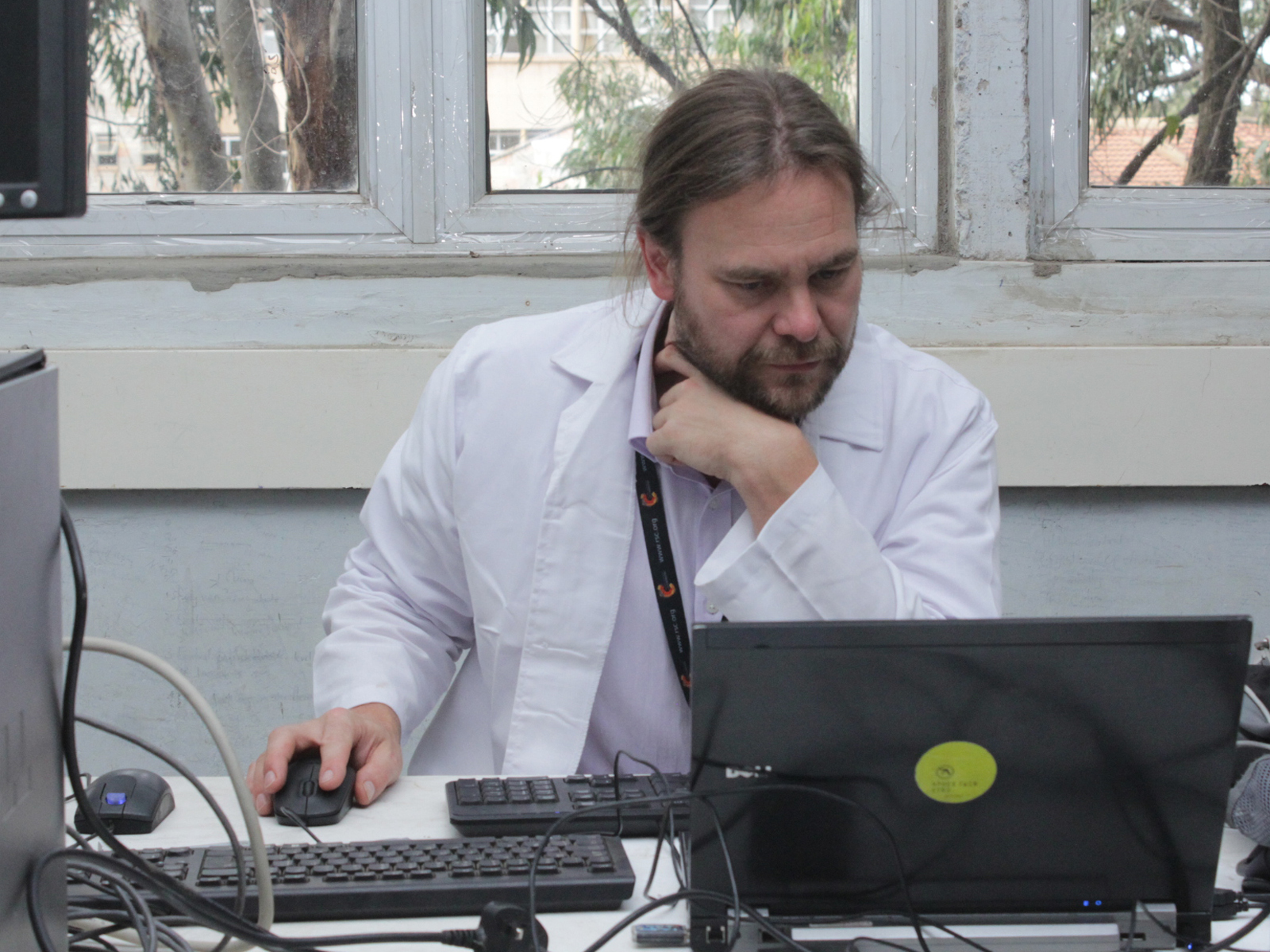
Dr Giles Edwards, co-founder of RORO Picture: © Royal Society of Chemistry
A partnership between universities, businesses, charities – and our own Pan Africa Chemistry Network – is building analytical science capacity in African universities, through a combination of training courses and donated equipment.
In 2005 Giles Edwards was working as a research officer at Liverpool John Moores University, running the chemistry department’s mass spectrometry service.
Between stints in the lab, he would walk along the corridor of the high-rise science block, to grab a cup of tea with friends. The corridor afforded a good view of the car park below, and in the carpark were skips full of discarded material, including some reusable laboratory kit.
"Some of it obviously needed to be thrown away," he says, "but some of it was fine. I started salvaging those items that were still in good working condition, and that’s how my office became full of scientific equipment!"
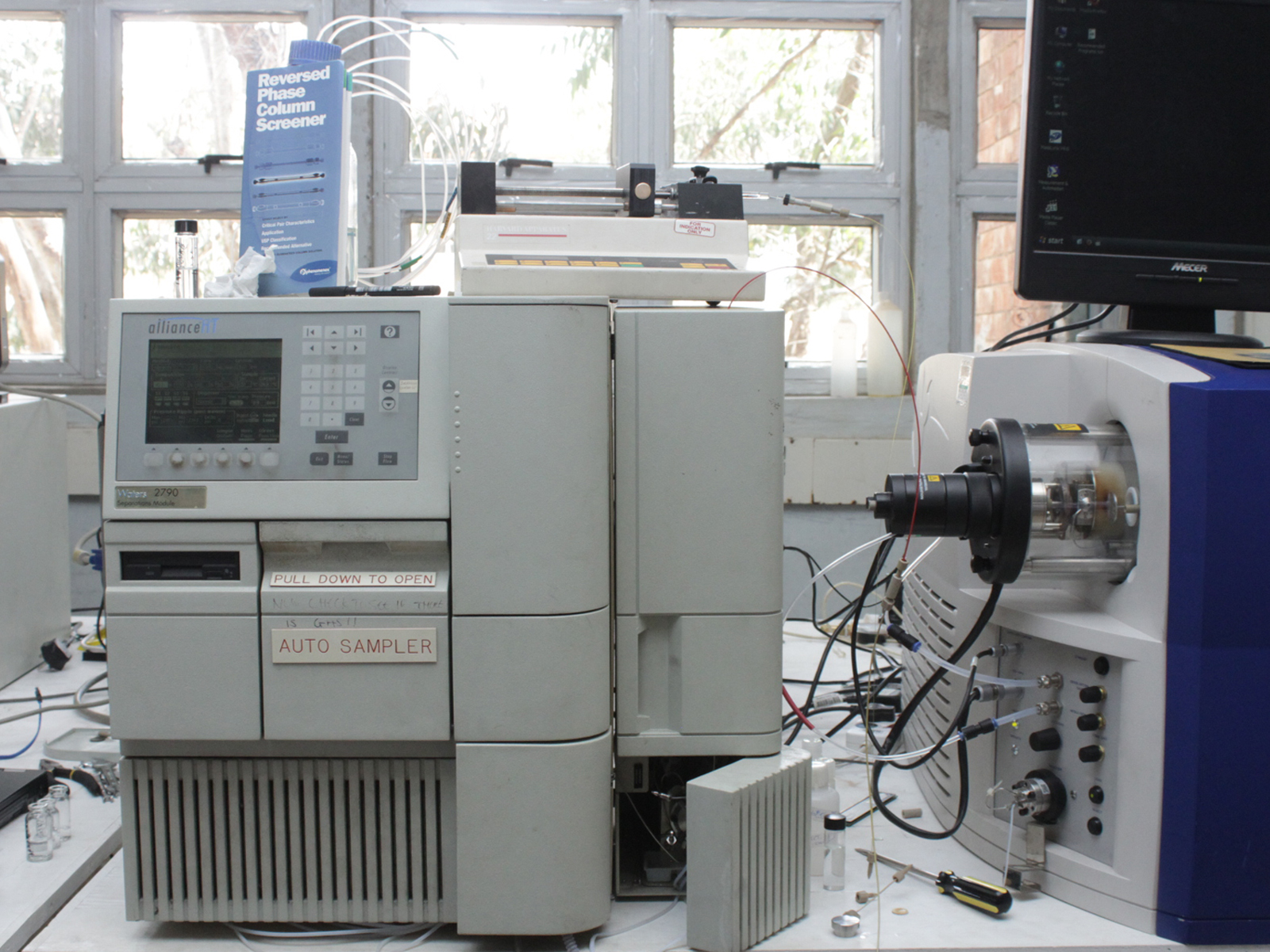
Giles sent LC-MS (liquid chromatography mass spectrometry) systems to Africa Picture: © Royal Society of Chemistry
Collecting and recycling
He began asking individuals and companies to donate equipment and consumables. His collection grew rapidly and he started looking for ways to get the equipment to people in need of it.
In 2009 he co-founded the charity Recycling Organisation for Research Opportunities (RORO), and started sending equipment such as books, glassware, and spectrometry systems to academics in developing countries, from Egypt to Pakistan, and from Nepal to South Sudan.
Among the equipment RORO sent were LC-MS (liquid chromatography mass spectrometry) systems. LC-MS is a vital technique for analytical chemistry, allowing researchers to analyse substances from pharmaceuticals to natural products. The equipment is commonplace in UK universities, but is much harder to come by in Africa.
"African scientists get charged so much more money for the spectrometers than we do", Giles explains. "You have the parent company that sells the product, then you have the local branch, and they sell it to a distributor, and there could be another distributor after that. So you’ve got a massive chain of custody, and everyone’s putting their money on top."
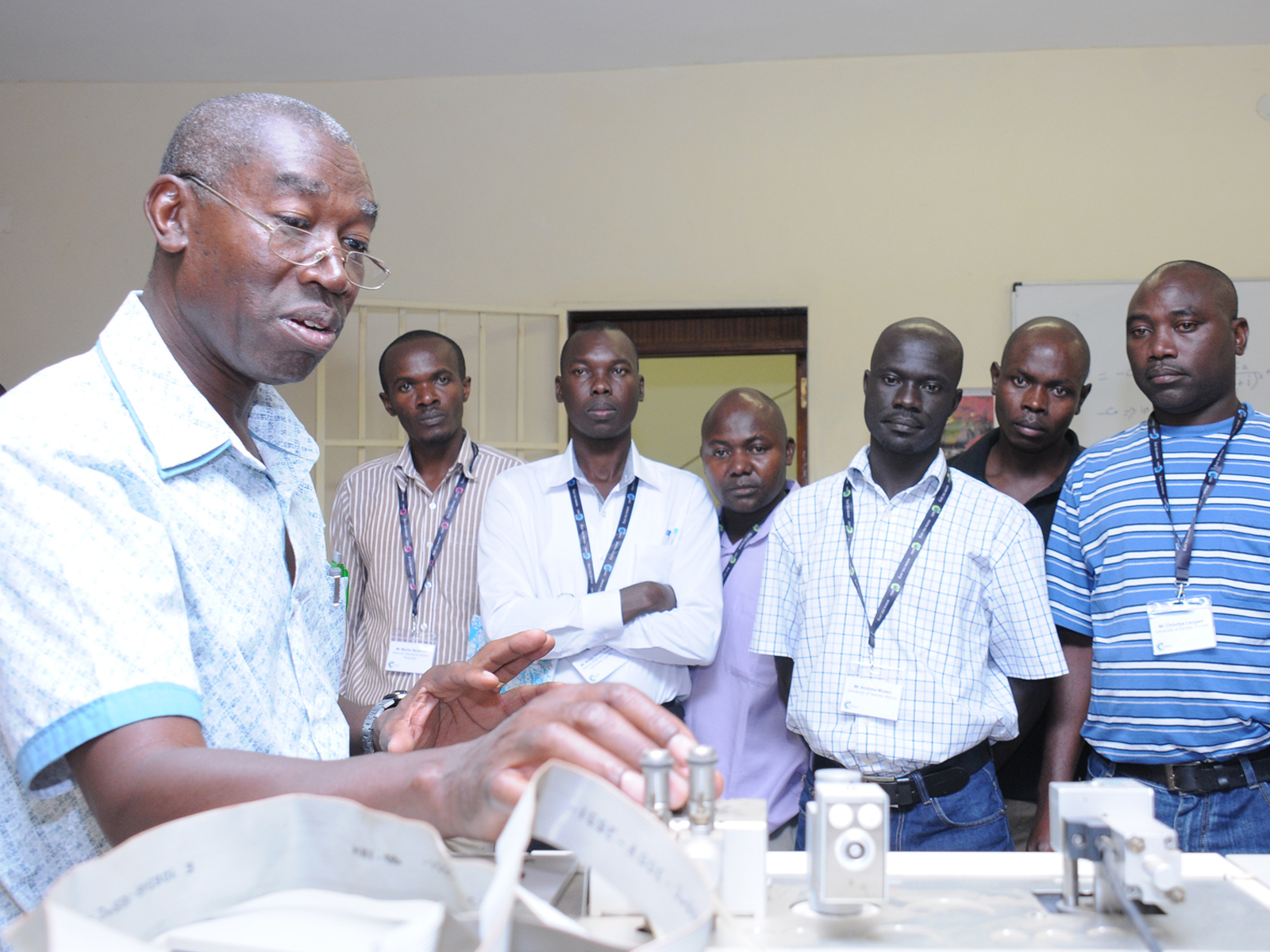
Dr Anthony Gachanja (left), professor of chemistry at Jomo Kenyatta University of Agriculture and Technology (JKUAT), trains African scientists in GC-MS and LC-MS Picture: © Royal Society of Chemistry
Expensive equipment standing idle
The cost of a fully trained installation engineer is also prohibitive, which means equipment can get installed poorly, and so may not work correctly from the start. Instrumentation is expensive to maintain, so if parts fail instruments may stay broken and can stand unused for long periods. The labs may also lack access to basic, consumable items needed to keep the equipment running, and there is often very little operator training or ongoing support
Anthony Gachanja, professor of chemistry at Jomo Kenyatta University of Agriculture and Technology (JKUAT) in Nairobi, Kenya, has experienced many of these frustrations.
"We have had several LC-MS mass spectrometers in Nairobi for some time, but we haven’t been using them to their full capacity, because the expertise needed to maintain the equipment, and characterise the data, is not easy to come by.
Time and again scientists will use equipment that isn’t fully optimised, just because they don’t know how to do it.
Training analytical chemists in sub-Saharan Africa
The Royal Society of Chemistry’s Pan Africa Chemistry Network, in partnership with a number of multinational companies and universities, is working to address these problems, and in 2015 the PACN agreed a five-year partnership with GSK to fund an analytical science training programme.
The programme built on a volunteer-led training scheme started in 2004 by Anthony Gachanja at JKUAT, and the partnership has allowed it to expand across the PACN hubs, which are based at universities in Ethiopia, Ghana, Kenya and Nigeria.
The training workshops initially focused on GC-MS (gas chromatography mass spectrometry), and have now expanded to include LC-MS. The techniques are complementary, and both are crucial in analytical chemistry. They are used in everything from environmental monitoring and food safety, to forensic science and medicine.
Anthony is one of the lead trainers on the programme, and his involvement has helped it go from strength to strength. In 2017 the PACN ran six week-long training courses across four countries, training over 90 researchers. The programme aims to train at least 400 analytical chemists by 2020.
As well as providing training, the PACN helps universities acquire the resources they need, and in 2010 started working with Giles Edwards and his charity, RORO, to send equipment to some of the PACN hubs.
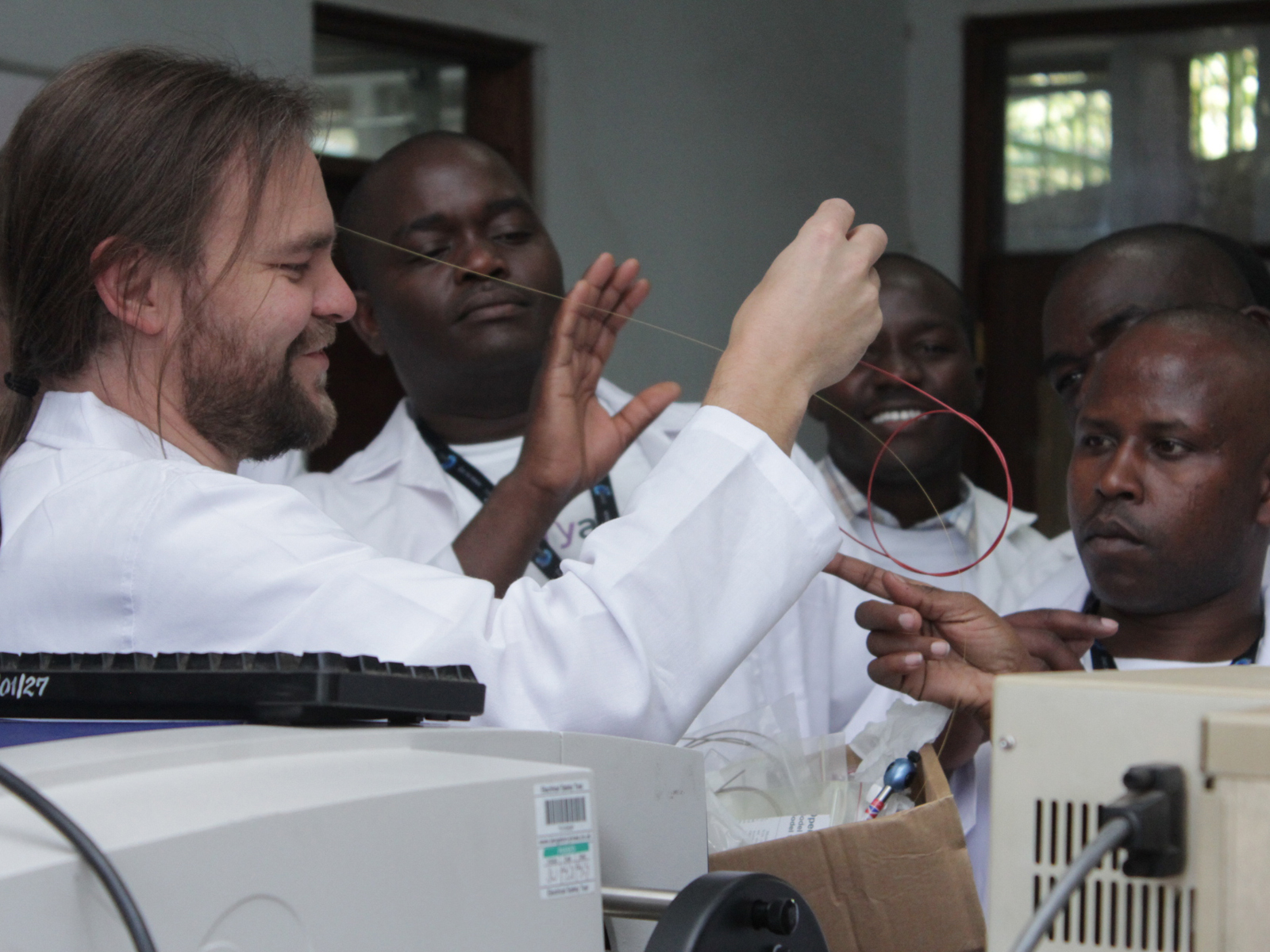
Giles was a trainer on the PACN workshop at KNUST, which trained chemists in LC-MS Picture: © Royal Society of Chemistry
"The first RORO shipment in collaboration with the PACN was to Kwame Nkrumah University of Science and Technology (KNUST), in Ghana", says Giles. "It included an LC-MS/MS mass spectrometer donated by the Waters Corporation, which at the time had a market value of around £50,000.
In 2017, RORO installed two LC-MS/MS mass spectrometers, also donated by Waters, at JKUAT, and these were used in teaching the first LC-MS workshop, which was held at JKUAT in September last year.
As well as the mass spectrometers from the Waters Corporation, JKUAT has also received two rotary pumps from Providion, and a brand-new nitrogen generator, donated by Peak Scientific.
"LC-MS instruments consume so much nitrogen", explains Giles, "and bottled nitrogen in Africa is very, very expensive. So even if you have an LC-MS system, it’s too expensive to run unless you have a nitrogen generator."
Giles, who now works for Anthias Consulting, joined Anthony as a trainer on the course. He wrote the course materials as part of his work for Anthias, and they have generously allowed the PACN to use them for free in Africa.
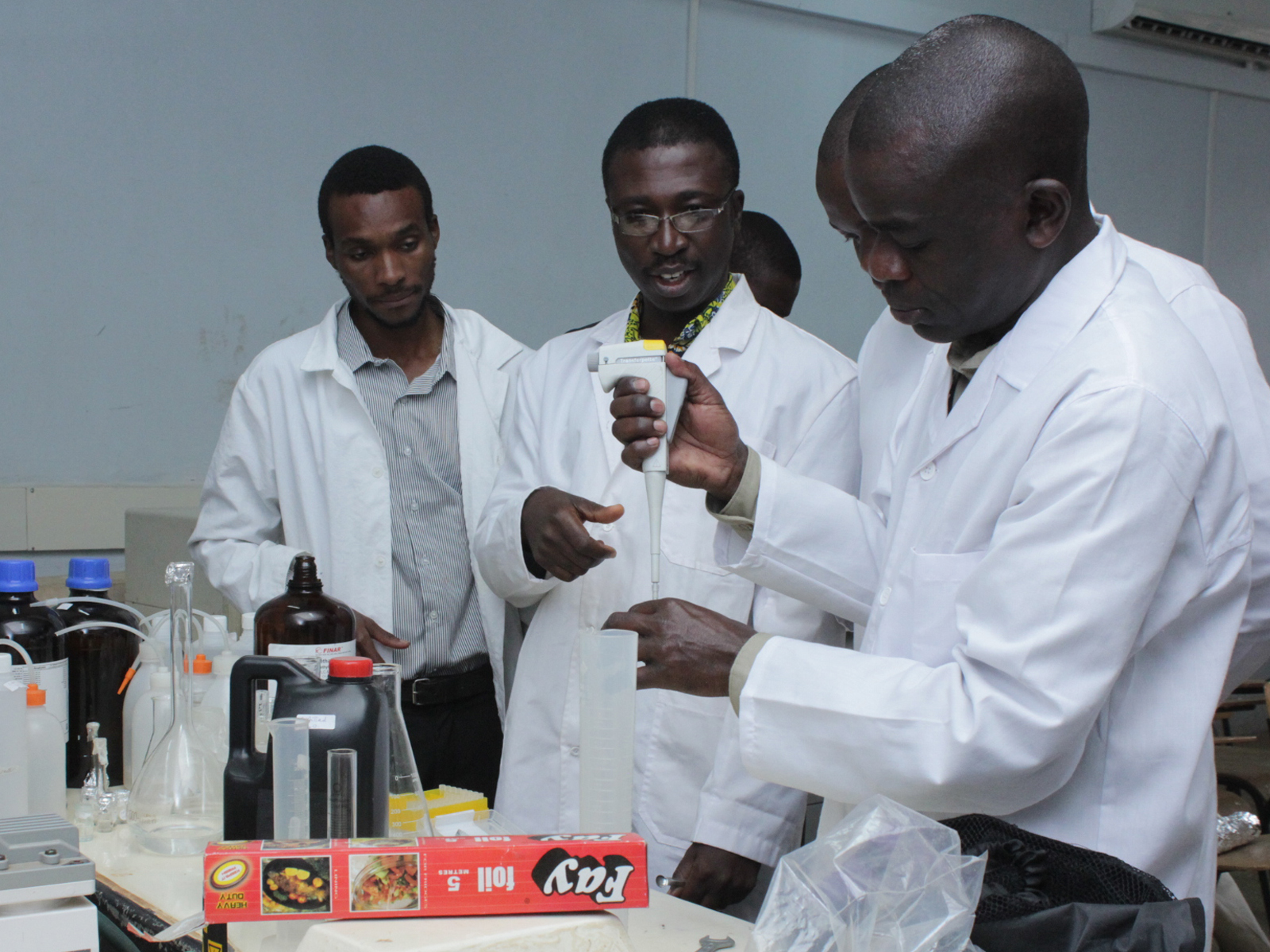
Nathaniel Boadi (centre) attended the course as a member of the PACN Picture: © Royal Society of Chemistry
Advantages for pharmaceutical research
Nathaniel Boadi, from KNUST in Ghana, and Adesina Oluwaseun, from the University of Lagos, Nigeria, are members of the PACN, and attended the course to improve their skills in LC-MS.
They explained that although GC-MS is cheaper than LC-MS, it relies on being able to vaporise the samples into the gas form first, which doesn’t work for non-volatile substances (those with a very high boiling point), or thermolabile substances (those that degrade at high temperature).
LC-MS can be carried out directly with liquid samples, and is therefore suitable for a much wider range of compounds than GC-MS.
"Those of us who work in pharmaceuticals mainly deal with thermolabile substances", says Adesina, "so it’s great to have this LC-MS training."
"There are some scientists who work on non-volatile mixtures, some of whom have acquired LC-MS equipment, but have barely used it due to lack of training," adds Nathaniel. "This training will now empower African scientists to not only use the equipment, but also to maintain it so it lasts."
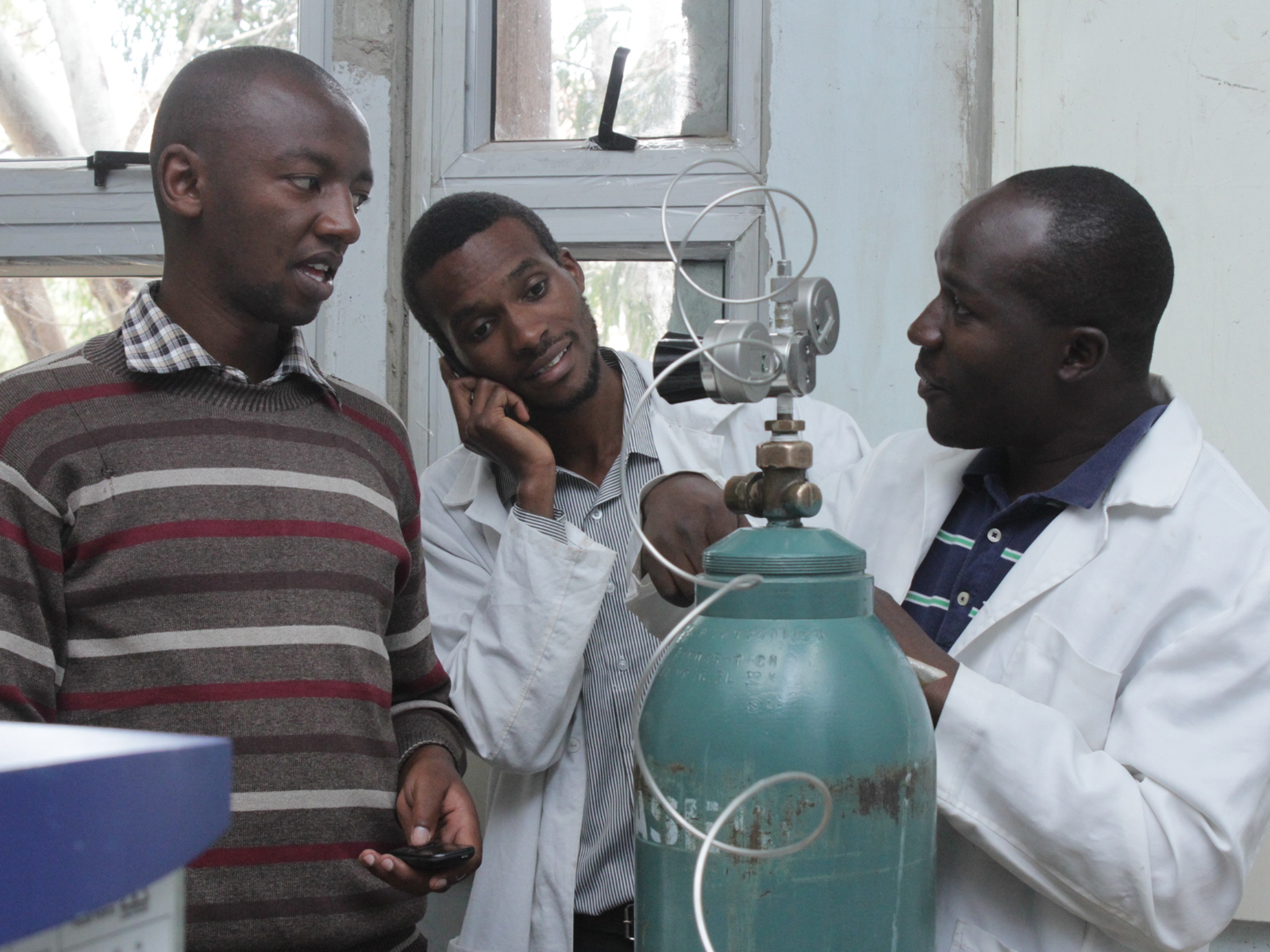
Dismantling and reassembling the equipment is a key part of the training Picture: © Royal Society of Chemistry
Getting hands-on
One of the key aspects of the course is the practical workshops, which allow participants to get hands-on with the equipment. "Not only did we cover the theoretical and practical aspects of LC-MS”, says Anthony, “but the participants had the opportunity to dismantle and reassemble the mass specs."
Taking the equipment apart gives the delegates something that an analytical chemist might not normally have: an understanding of the inner workings of the instrumentation, which allows them to fix it when things go wrong in future.
"They can use their knowledge to fix problems with the instruments," says Anthony, "rather than guessing where the problem is."
Growing and growing
"Analysis is a key component of economic development", reflects Anthony, "and without analytical capabilities, African countries won’t be able to grow economically, or make the most of their resources. Having access to more instrumentation will help, because once you have more instruments you have better scientists and better science."
"We are training local trainers for each of the hubs, and this training will now multiply those skills, and as it multiplies you’ll get more research and more analysis, for the betterment of the communities in Africa.
I think when it comes to my retirement I will be a happy person.
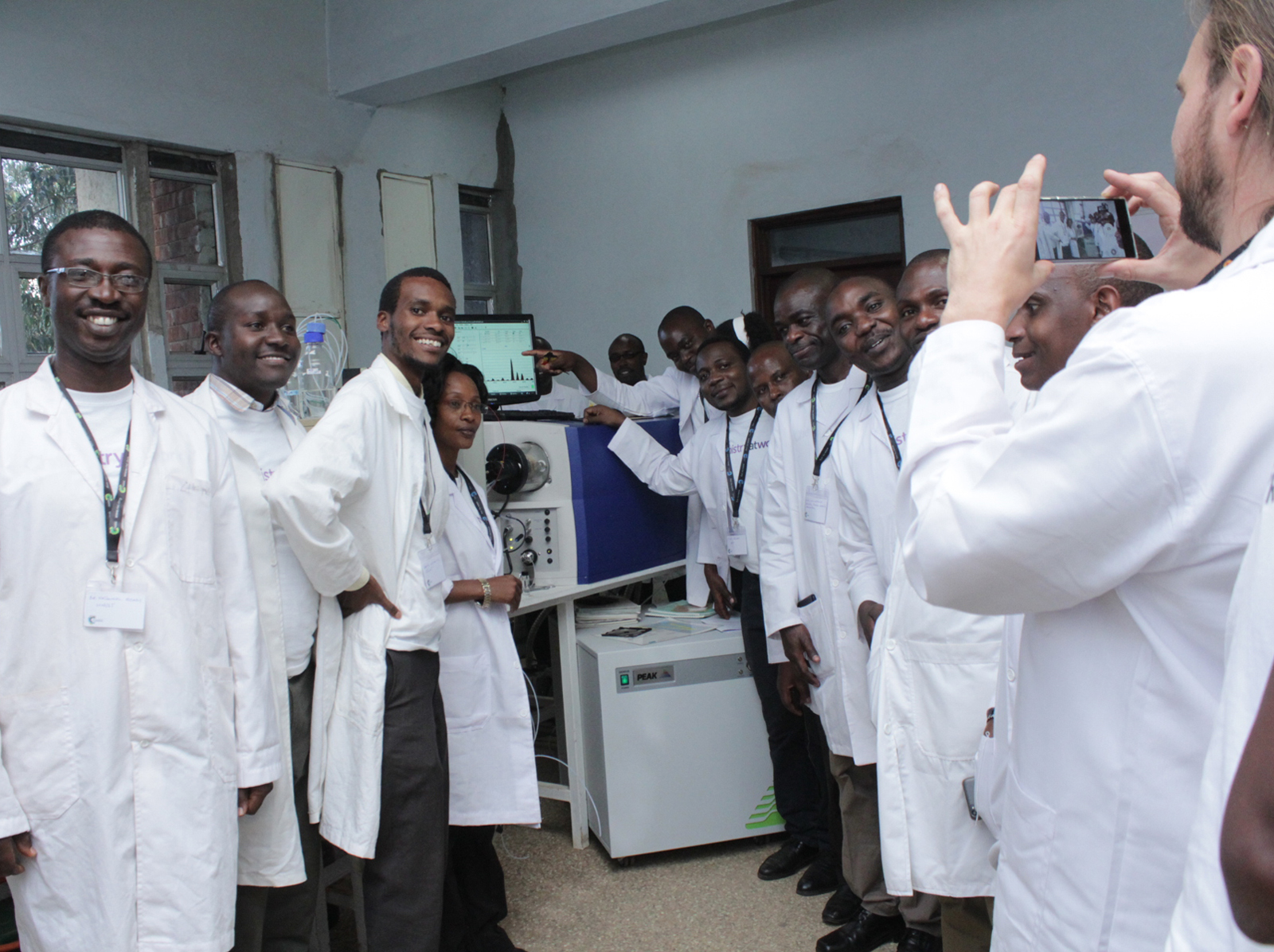
The workshops build communities of scientists that can work together to further their research Picture: © Royal Society of Chemistry
A problem shared…
The analytical science courses teach vital skills, which will have real applications in the day-to-day research lives of the delegates. But they also bring scientists together, to collaborate and problem-solve.
"The course delegates have a WhatsApp group", says Giles, "and we have active discussions going on at the moment. I’ve been answering questions from the course delegates via WhatsApp."
Helen Driver, who leads the PACN, says: “Collaboration is vital in all areas of science and research, and our work with Africa is a great example of this; we work with companies, individuals, other charities and our team of universities across Africa. This new LCMS course was made possible due to the collaboration between GSK, Anthias Consulting, Waters Corporation, Peak Scientific, Providion, The University of Manchester, RORO, and our hub universities.
This shows the power of collaboration and what can be achieved by bringing the right team together.
Anthony and Giles both started with some salvaged equipment, expertise, a bit of imagination and a desire to help. Their respective endeavours have grown and grown, and with the help of each other and a network of organisations, institutions and individuals, they will leave a legacy of analytical chemistry that will have real benefits for the future of Africa.
Meet the scientists
We spoke to some of the delegates from the programme, about their research interests and what they learned on the course.
The workshop is a great opportunity to learn and develop the skills I need to solve our problems.
Jane Njoki Mburu, Kenyatta University
I am a senior technician at Kenyatta University in charge of instrumentation.
We currently have post graduate students undertaking various research using LC-MS, including the occurrence of mycotoxins in cereals and quantification of aflatoxin and amino acids in food.
However, we have been lacking experience on the operation, servicing and maintenance of this instrument. This has resulted in lots of technical challenges and eventually high cost of maintenance as hawse had to outsource for expertise every time the system failed.
The LC-MS workshop is a great opportunity to learn and develop the necessary practical analytical skills that I need to solve our problems.
Having learned practical skills on proper use of the LC-MS, I will be able to operate the LC-MS instrument more efficiently, overcome challenges that come along with method development, data acquisition, cleaning and maintenance of the different parts of the equipment. I will also share my newly acquired knowledge with the students and the technical members involved in research.
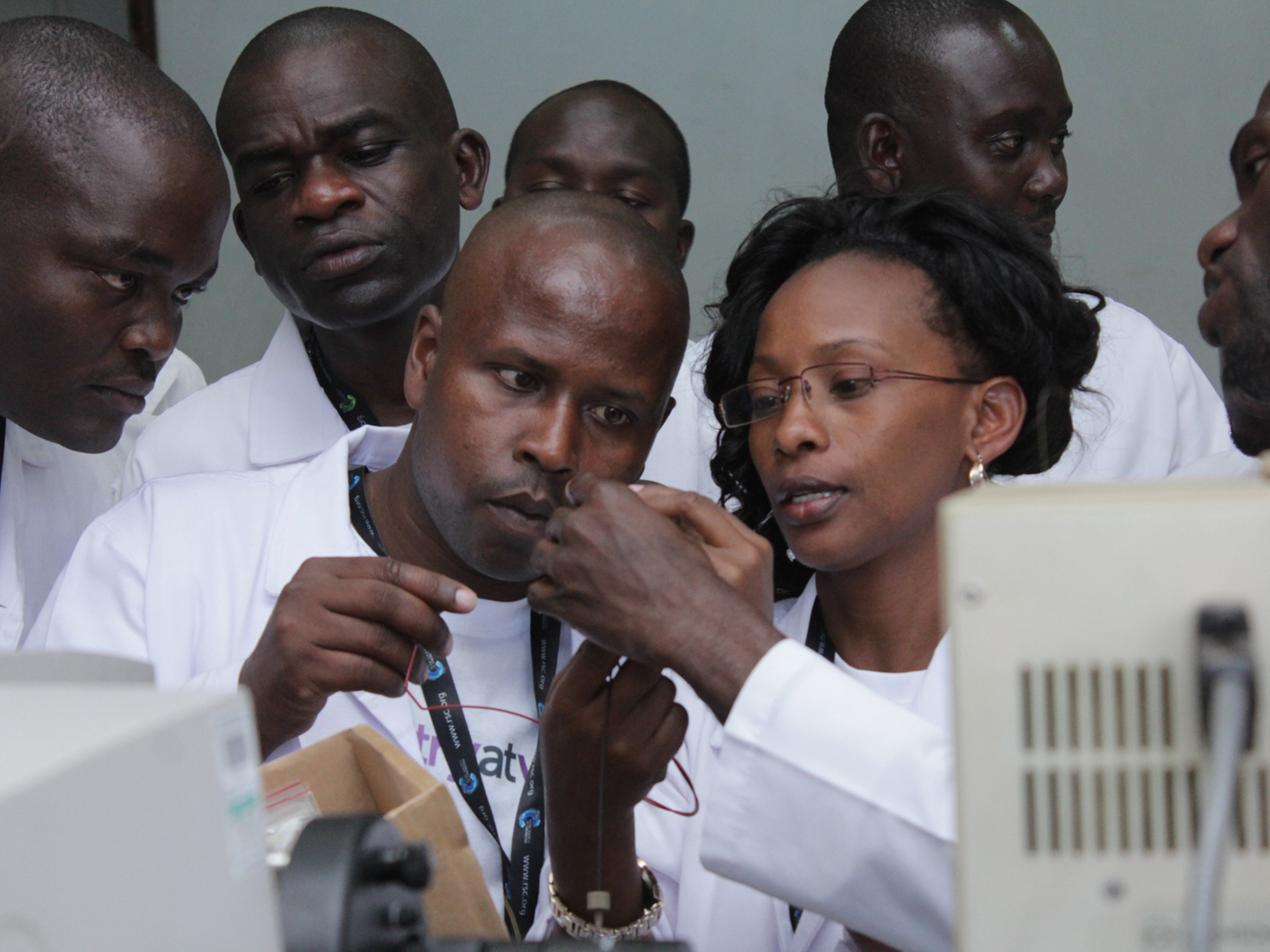
Jane (right) at the recent workshop Picture: © Royal Society of Chemistry
I will apply the new techniques I have learnt to improve our operation of the LC-MS/MS equipment.
Edmond Momanyi, Kenya Plant Health Inspectorate Service (KPHIS)
My work involves testing pesticide residue in fruits and vegetables both for local trade and the export market in Europe.
I will apply the new techniques I have learnt to improve our operation of the LC-MS/MS equipment thereby improving the quality of results.
I will also be able to expand the scope to test more pesticides, and apply new troubleshooting techniques learnt during the workshop to identify and solve problems that arise.
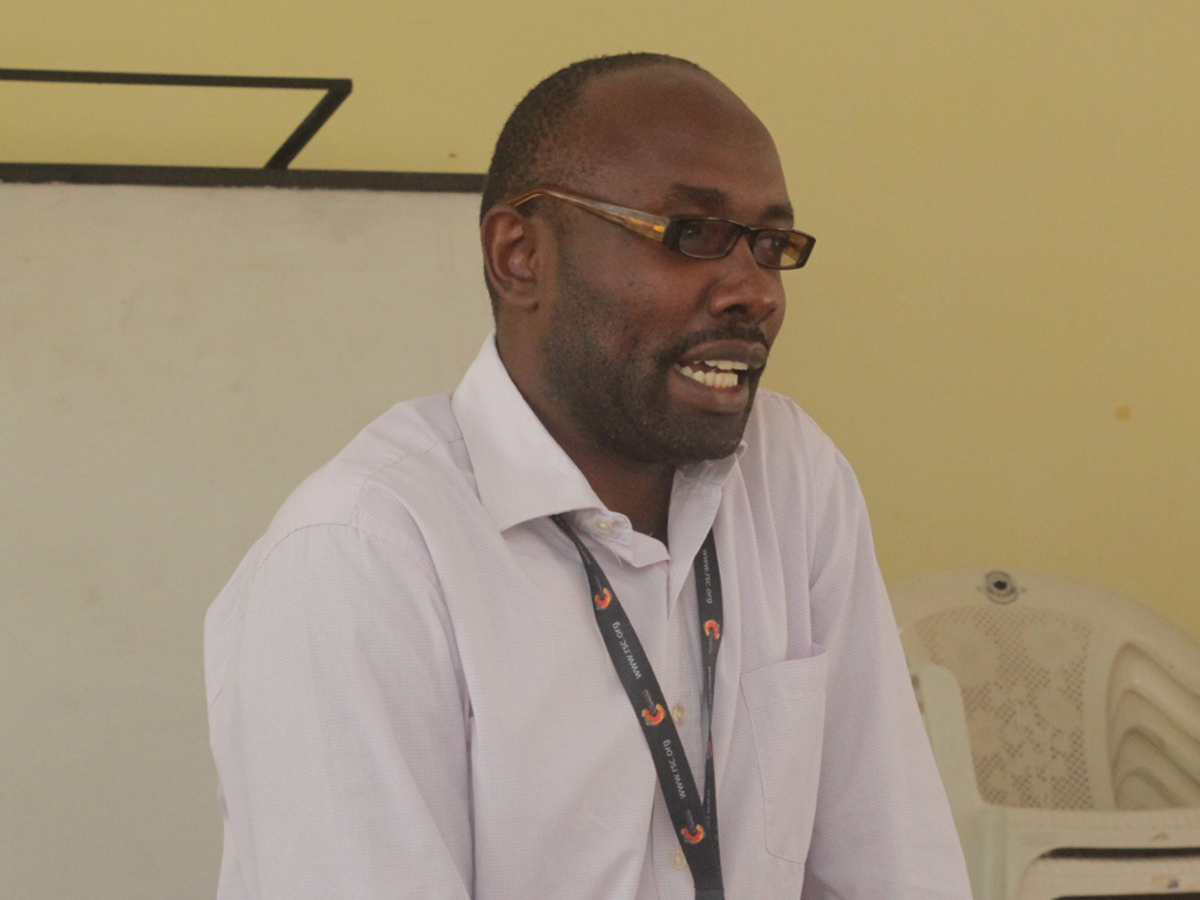
Edmond Momanyi at the recent workshop Picture: © Royal Society of Chemistry
I am now equipped with the skills to... generate credible and reliable scientific data.
Kurgat Justus, International Centre of Insect Physiology and Ecology (ICIPE)
For the first time I have been able to understand each component of the instrument, what it does and how to troubleshoot.
My favourite part was the optimisation of tuning parameters in mass spectrometry. This was done methodically and stepwise and I found it so easy to apply. I am now equipped with the skills to build parameters which will suit my instrument appropriately, and in this way I will be able to generate credible and reliable scientific data.